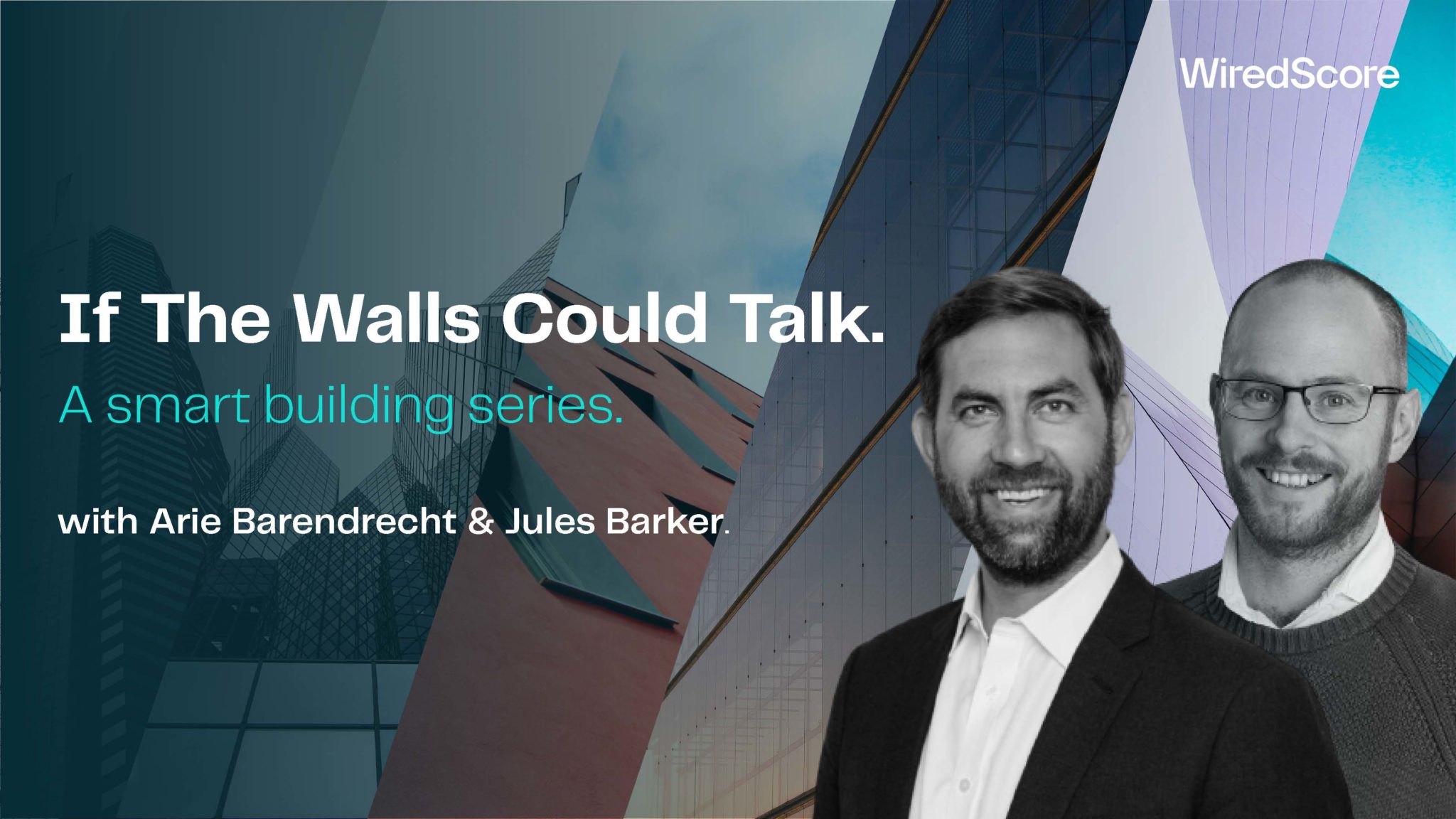Smart and sustainability: Reducing the environmental impact of the built environment
Posted:
4 / 12 / 2022
Tagged:

Table of contents
- Episode 1: Arie Barendrecht talks with Doug Stewart, Head of Digital Advisory at Cushman & Wakefield
- Episode 2: Arie Barendrecht in conversation with Brendan Wallace, Co-Founder and Managing Partner at Fifth Wall.
- Episode 3: Jules Barker in conversation with Jeff Vittorio, Vice President of Property Management at Columbia Property
- Episode 4: Jules Barker and Arie Barendrecht talk with Charlotte Meara, WiredScore’s Finance Director.
If The Walls Could Talk is a series of conversations about smart buildings, connecting key thinkers in the property world with each other, and you.
You’ll hear from landlords and developers, advisors and tenants in the smart building space all of whom bring their unique perspectives on what the term smart building actually means and what it takes to create a smart building that works, delivers and reduces its impact on the built environment.
The series follows four key themes throughout and leaves you with practical takeaways from each conversation.
- How to approach creating a smart building.
- User-first design: How to create a smart building that delivers.
- Technical foundations of smart: How to create a smart building that works
- Smart and sustainability: Reducing the environmental impact of the built environment
““Tackling the climate crisis is the global imperative of our time.”
Buildings, and associated emissions, contribute nearly 40% of all carbon emissions globally, creating mounting pressure on real estate to provide a green path forward.
Whilst the industry can do a great deal to improve sustainability by improving building materials and processes during development, improving in-use building performance is critical. This requires a collective commitment.
Topic four of ‘If The Walls Could Talk’ discusses the importance of sustainability within real estate and its link to ESG, which changes generate the highest impact and answers questions around common challenges around procuring technologies to optimize in-building operating regimes.
We discuss the benefits of sustainable assets to investors and asset value, which investments have the biggest impact on ESG goals and reallocating capital to make buildings more sustainable in line with government taxes.
Smart and sustainability: Reducing the environmental impact of the built environment. Episode 1.
In this episode, we kick off this topic by speaking to Doug Stewart from Cushman & Wakefield. As the Head of Digital Advisory, Doug helps Cushman & Wakefield integrate technology into their day to day services.
Doug and Arie, WiredScore’s Founder and CEO discuss the trends driving smart buildings, how landlords could overcome challenges around retrofitting buildings to make them smart and the connection between data and sustainability.
In this episode, we kick off this topic by speaking to Doug Stewart from Cushman & Wakefield. As the Head of Digital Advisory, Doug helps Cushman & Wakefield integrate technology into their day to day services.
Doug and Arie, WiredScore’s Founder and CEO discuss the trends driving smart buildings, how landlords could overcome challenges around retrofitting buildings to make them smart and the connection between data and sustainability.
Episode 2.
Arie Barendrecht speaks to Brendan Wallace, Co-Founder and Managing Partner at Fifth Wall, the largest venture capital firm advising corporates on and investing in Built World technology.
In the US alone, decarbonizing US assets will cost 18 trillion dollars. That’s why, in this episode, we discuss Fifth Wall’s climate tech fund, investor returns on climate technology, and the challenges and opportunities for real estate owners.
Arie Barendrecht speaks to Brendan Wallace, Co-Founder and Managing Partner at Fifth Wall, the largest venture capital firm advising corporates on and investing in Built World technology.
In the US alone, decarbonizing US assets will cost 18 trillion dollars. That’s why, in this episode, we discuss Fifth Wall’s climate tech fund, investor returns on climate technology, and the challenges and opportunities for real estate owners.
Episode 3.
Jules Barker speaks with Jeff Vittorio, the Vice President of Property Management at Columbia Property Trust, the major US landlord, and developer with assets all across New York, Boston, Washington, and San Francisco.
Jeff explains how, at Columbia Property Trust, they are working to create a more hospitality-focused experience, with tenants being seen as guests, and how Columbia Property Trust is using technology to measure, improve and report against your goals. They also discuss the benefits of using global benchmarking tools during design stages to ensure the whole lifecycle of the building is thought through and that they are following best practices at each stage.
Jules Barker speaks with Jeff Vittorio, the Vice President of Property Management at Columbia Property Trust, the major US landlord, and developer with assets all across New York, Boston, Washington, and San Francisco.
Jeff explains how, at Columbia Property Trust, they are working to create a more hospitality-focused experience, with tenants being seen as guests, and how Columbia Property Trust is using technology to measure, improve and report against your goals. They also discuss the benefits of using global benchmarking tools during design stages to ensure the whole lifecycle of the building is thought through and that they are following best practices at each stage.
Episode 4.
Jules Barker and Arie Barendrecht talk to Charlotte Meara, WiredScore’s Finance Director about the role smart buildings play in reducing global carbon emissions.
They discuss the key takeaways from the previous three episodes, including the balance between making incremental vs. big bang decisions, long-term investing, and how sharing more information more openly would enable a more sustainable future for us all.
Jules Barker and Arie Barendrecht talk to Charlotte Meara, WiredScore’s Finance Director about the role smart buildings play in reducing global carbon emissions.
They discuss the key takeaways from the previous three episodes, including the balance between making incremental vs. big bang decisions, long-term investing, and how sharing more information more openly would enable a more sustainable future for us all.